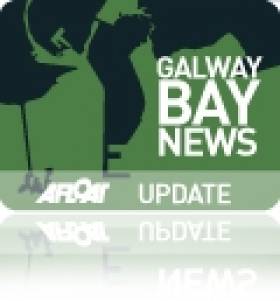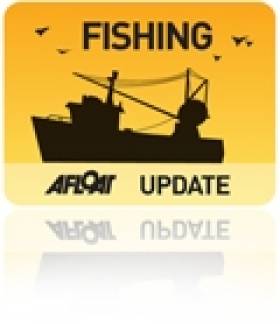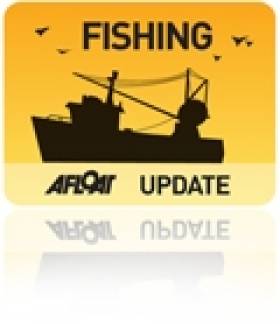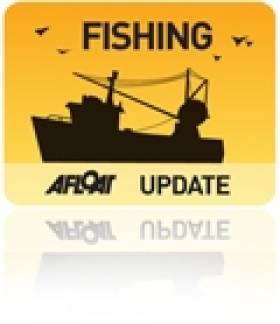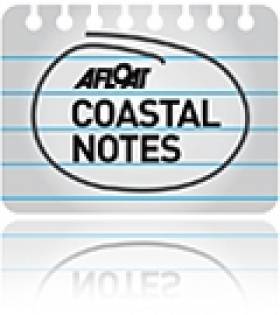Displaying items by tag: Simon Coveney
Groups To Protest Marine Minister's Office Over Galway Bay Salmon Farm
#FishFarm - A group opposed to the Galway Bay deep-sea salmon farm proposals has announced it will protest the constituency office of Marine Minister Simon Coveney this Saturday 15 December.
In a statement to the media, No Salmon Farms At Sea (NSFAS) said that it will join likeminded groups Save Bantry Bay, Save Galway Bay, FISSTA and Friends of the Irish Environment, along with other local and national organisations, in a protest march through Carrigaline, Co Cork to Minister Coveney's office in the town, where invited speakers will address the crowd to express their opposition to the fish farm.
As previously reported on Afloat.ie, the 15,000-tonne deep-sea organic salmon farm would be located on a 500-hectare site in Galway Bay off Inis Oirr in the Aran Islands, and would be one of the largest projects of its kind in Europe, projected to be worth more than €100 million annually for the economy, according to Bord Iascaigh Mhara (BIM).
But the proposals have raised the ire of local anglers and conservationists who fear the development could have a negative impact on wild salmon numbers in the area.
"Minister Coveney has been a strong supporter of the aquaculture industry and we intend to let him know that his support is misguided and will result in catastrophe not only for our stocks of wild atlantic salmon and sea trout, but also for the communities and local businesses that depend on their very existence," said NSFAS.
The statement also cited the recent international study involving experts from Inland Fisheries Ireland which concluded that 39% of all young salmon mortalities are directly attributable to sea lice in areas where salmon farming takes place.
It added: "The highly inflated number of jobs, which BIM claim will be created, will be far outweighed by the number of jobs lost in areas where no other industry exists apart from that in tourism...
We have a world class sport fishery here in Ireland and our outwardly projected clean environment is one of our greatest assets. However it is fragile and will be destroyed if the salmon farming industry is developed further.
"Anglers and conservationists will do everything in their power to prevent any further destruction to our environment and already declining wild salmon and sea trout stocks."
Meanwhile, in today's Irish Times, angling correspondent Derek Evans writes that "anglers, stakeholders, hoteliers, restaurateurs, islanders and west coast citizens are 'up in arms' and rallying in large numbers in opposition" to what he describes as "this outrageous proposal".
He also backtracked on his previous claim about the location of the deep-sea farm as "a step in the right direction", explaining that he was contacted by a man living on Inis Oirr who said the location for the new fish farm is just "one land mile" opposite the beach, posing a threat to its tourism assets.
The Irish Times has much more on the story HERE.
Coveney Warns Brussels on Irish Mackerel Industry
#fishing– Simon Coveney TD, Minister for Agriculture, Food and Marine warned the Council of Fisheries Ministers in Brussels today, that the over reliance on pelagic stocks for the annual exchange in fishing opportunities with Norway is having a detrimental effect on our own Pelagic fleet with knock on consequences for our processors.
Minister Coveney said " EU/Norway is a very important agreement for the EU, but Ireland has traditionally lost out in the overall exchange of fishing opportunities because key pelagic stocks of interest to us, in particular Blue Whiting, form part of the exchange for Arctic Cod, where we gain little".
Norway's Pelagic fleet will see large reductions in their Atlanto Scandian Herring(ASH) and mackerel quotas for 2013, and are demanding large increases in the amount of Blue Whiting and other pelagic stocks to offset this, they have large amounts of Arctic cod to offer in return, but Ireland receives only a small share of this. Minister Coveney explained "the Irish Pelagic fleet is experiencing the same reductions on Norwegian herring and mackerel and to expect them to suffer more hardship by transferring increased amounts of Blue Whiting and Horse mackerel to Norway is unfair and unacceptable, and I made my views on this crystal clear at the Council".
On the question of setting fishing levels for mackerel, Ireland's most important stock, the Minister said "I am concerned about the state of the mackerel stock which is being threatened by the irresponsible and unsustainable fishing by Iceland and the Faroe islands on the stock. I support following ICES scientific advice on setting the 2013 mackerel TAC. I do not however consider that it is reasonable to reduce further the EU share of the stock in response to overfishing of Iceland and the Faroe Islands".
Ireland has secured support at Council on this issue from the United Kingdom, France, Spain, Portugal and Poland. Minister Coveney went on to say "I believe that the EU and Norway, as the major shareholders should agree to implement without delay a joint approach including trade sanctions to bring pressure to bear on Iceland and the Faroe islands to come to the table with justifiable demands on a cohesive management framework for the stock which is in all our interests".
Talks between the EU and Norway on the annual fishing agreement and on mackerel commence next week in Bergen, Norway and are scheduled to conclude on Friday 7th December.
Minister 'Voted To Allow Spain to Overfish Irish Waters'
#FISHING - Marine Minister Simon Coveney has been accused of "hypocrisy" by supporting subsidies for modernising Europe's fishing fleets despite his previous opposition to overfishing.
The Sunday Times reports that Minister Coveney signalled his backing for new subsidies that would allow European fishermen to modernise their trawlers at a meeting to discuss reform of the Common Fisheries Policy recently.
However, environmental groups argue that such subsidies would be used by bigger fishing countries like France and Spain to exploit already dwindling fish stocks in Irish waters.
"Coveney and his advisers made a number of strategic mistakes in supporting the continued payments of subsidies to Europe's fishermen," said Markus Knigge, a consultant with environmental lobby group Ocean 2012.
"The Spanish are the main beneficiaries and they will use part of this money to improve their fleet, which will enter Irish waters and catch even more fish and deplete Irish stocks. Ireland really voted to allow Spain to overfish its waters."
Knigge said Minister Coveney's position on the matter was a U-turn on his previous commitment to end the practice of discarding fish at sea.
An agreement reached by Europe's fisheries ministers this summer was criticised as "vague" by environmental groups and 'fish fight' campaigners.
Meanwhile, Ebbie Sheehan of the Irish Fishermen's Organisation said that what Irish fishermen really needed was not subsidies but permission to land the fish they catch, instead of being forced to discard fish when they go over quota.
EU Fisheries Fund Allocation Deal Reached Today
Agreement on how a fisheries fund of approximately €6 billion will be allocated among EU Member States was reached in Luxembourg today following two days of negotiations at the EU Agriculture and Fisheries Council.
Minister for Agriculture, Food and the Marine, Mr. Simon Coveney T.D has been making the case to maximise Ireland's access to the fund which will provide significant funding to the seafood sector over the period 2014-2020, and enhance growth and jobs in this vital part of the economy.
In previous years Ireland's allocation from similar funds has been lower than warranted according to Minister Coveney who has been fighting to increase Ireland's share and deliver support to a sector which has the potential to create further jobs and assist in Ireland's economic recovery.
Not for the first time, the Fisheries Council worked through the night to come to a final compromise on the way in which funds will be spent to develop a competitive yet sustainable fishing industry. The fund, which will be used to support the new Common Fisheries Policy, (CFP) can be used for fleet modernisation, safety equipment, aquaculture development, adding value through processing, in addition to investment in new fishing gear to more effectively target stocks and assist in the reduction of discards.
Speaking early this morning, Minister Coveney stated that "The Irish seafood industry is a hugely important part of the economy, providing employment for more than 10,000 people. It is my job to drive a hard bargain on behalf of fishermen and their families but also to put a policy in place which will protect and build our fish stocks. Negotiating access to finance through the CFP is essential to that effort"
Coveney Offers Condolences to Drowning Victims Families
#condolences – Minister Simon Coveney today expressed his deep condolences to the families of Michael Galvin and Noel Dickinson who tragically lost their lives earlier this week. The funeral took place today in the village of Quilty in Co. Clare. Minister Coveney today called to the homes of both men to express his sympathy with their families on his own and on the Government's behalf.
"This has been a particularly tragic week at sea for Co. Clare and for Co. Cork. Poet and farmer John O'Leary tragically drowned off Beara Peninsula, Michael Galvin and Noel Dickinson have drowned in a fishing accident off Co. Clare and now today we have more tragic news of another drowning near Castletownbere in West Cork."
"My heart goes out to all of the families who are struggling to deal with the loss of their loved ones. This has been a shocking and tragic week in a year that has seen so much loss and sadness at sea."
New Harbour Charges Could End Trips to See Fungie
#IRISH HARBOURS - "Draconian" new charges for harbour users could bring an end to boat trips to see Dingle's most famous resident, according to The Irish Times.
Fungie the dolphin has been a mainstay of Dingle harbour for almost 30 years, but boat trips to visit him could cease to operate "with immediate effect" if charges of up to €9,000 are imposed "in advance" of the season.
Currently operators in the Dingle Boatmen's Association pay around €2,500 to use the harbour at the end of each season.
Association chairman Jimmy Flannery called on anyone working in tourism in Ireland to make submissions to the public consultation before the deadline next Friday 20 April.
As previously reported on Afloat.ie, yacht owners are also up in arms over the new charges proposed by Marine Minister Simon Coveney that could see their rates hiked by an incredible 800 per cent.
And the news comes not long after fellow Kerry harbour users protested proposed new bylaws to regulate their activities and impose new charges.
Massive Fee Increases Proposed for Harbour Yacht Berths
#IRISH HARBOURS - Yachts berthing at Ireland's main fishing harbours could see their charges hiked by an incredible 800 per cent.
According to The Irish Times, Marine Minister Simon Coveney has announced a mere 21 days for comment and consultation on the draft Fishery Harbour Centres (Rates and Charges) Order 2012. The consultation document is attached to the bottom of this post and available to download as a pdf.
The proposed new charges include an annual fee of €250 per metre for yachts, which could see a 10-metre yacht currently paying €312 a year for a berth shell out as much as €2,500 annually for the same space.
Additional water and electricity costs could even see this bill rise to €3,100 - for berths that come "without proper marina facilities in most cases".
The proposals apply to the State's six fishery centres at Killybegs, Rossaveal, Dingle, Castletownbere, Dunmore East and Howth, only two of which have pontoons suitable for leisure boats.
The Irish Times has more on the story HERE.
Donegal Marine Stakeholders Encouraged Over Integration Plan
#NEWS UPDATE - A Donegal TD is encouraging the county's marine stakeholders to submit suggestions for the Government's upcoming Integrated Marine Plan, as previously reported on Afloat.ie.
The plan, which will be published in the summer, "will be a national agenda for developing our country’s marine potential, across tourism, shipping, leisure, fisheries and other sectors," said Joe McHugh TD.
The Dáil deputy noted "it is significant" that Taoiseach Enda Kenny and Minister for the Marine Simon Coveney are "dealing with this personally" as "previous Governments did not give this type of prioritisation to the industry".
He added: “I encourage Donegal marine stakeholders who see potential for national development in the fisheries industry, sea tourism, marine leisure, oil production, renewable energy production, deep sea fisheries and in various other areas to make submissions to the Integrated Marine Plan."
More information on the Integrated Marine Plan can be found at www.oceanwealth.ie.
Meeting for Bantry Bay Fish Farm Opponents Tonight
#COASTAL NOTES - Bantry Bay has reached its capacity for salmon farming, says the committee formed to oppose a proposed new facility at Shot Head.
Save Bantry Bay has called a public meeting for supporters tonight (24 March) at Eccles Hotel in Glengarrif, Co Cork, starting at 8.15pm - where chairman Kieran O'Shea will give a presentation on the group's "wide-ranging objections", as The Fish Site reports.
Minister for the Marine Simon Coveney is currently considering the licence application for Marine Harvet's proposed salmon farm at Shot Head in Adrigole.
Concerns among the committee's members include the potential spoiling of the area's natural beauty having a knock-on effect on tourism, and the environmental consequences of algae blooms from nitrogen and phosphorous waste.
Local fisherman fear that a fish farm of more than 100 acres would see the closing off of part of an "important ground for shrimp and prawn".
Possible infection of wild salmon in local river systems by sea lice from farmed salmon is also an issue, with the Environmental Impact Statement for Shot Head highlighting an outbreak of lice at Marine Harvest's facility in Roancarrig two years ago.
The Fish Site has more on the story HERE.
- Coastal Notes
- Fishing
- Bantry Bay
- Co Cork
- fish farm
- salmon farm
- Shot Head
- Adrigole
- Glengarrif
- Eccles Hotel
- Save Bantry Bay
- Minister for the Marine
- Simon Coveney
- Marine Harvest
- tourism
- environment
- algae blooms
- nitrogen
- phosphorous
- waste
- shrimp
- prawn
- infection
- Wild Salmon
- sea lice
- environmental impact statement
- Roancarrigh
Make or Break Time for Fish Discards Ban
#FISHING - The Guardian reports that an alliance of EU member states plans to "hijack" a council meeting of the union's fisheries ministers today to prevent a ban on fish discards.
EU maritime affairs commissioner Maria Damanaki has stated her commitment to ending the practice, describing it as “unethical, a waste of natural resources and a waste of fishermen’s effort.”
Half of all fish in the North Sea - and up to two-thirds in other areas - are thrown back under the quota system implemented under the EU's common fisheries policy. The practice was recently highlighted by TV chef Hugh Fearnley-Whittingstall's 'Fish Fight' campaign.
Minister for the Marine Simon Coveney has called on EU states to support Ireland's effort to deal with fish discards, as previously reported on Afloat.ie.
But some member states, led by France and Spain, have dismissed the proposed ban as "unrealistic" and "too prescriptive", and will attempt to pass a declaration to allow the practice to continue indefinitely.
According to the Guardian, the charge is being led by industrial-scale fishing enterprises who want to retain the permission to discard lower value fish in order to maximise profits.
Brussels insiders say that if the declaration were to pass it would "kill the reform".


























